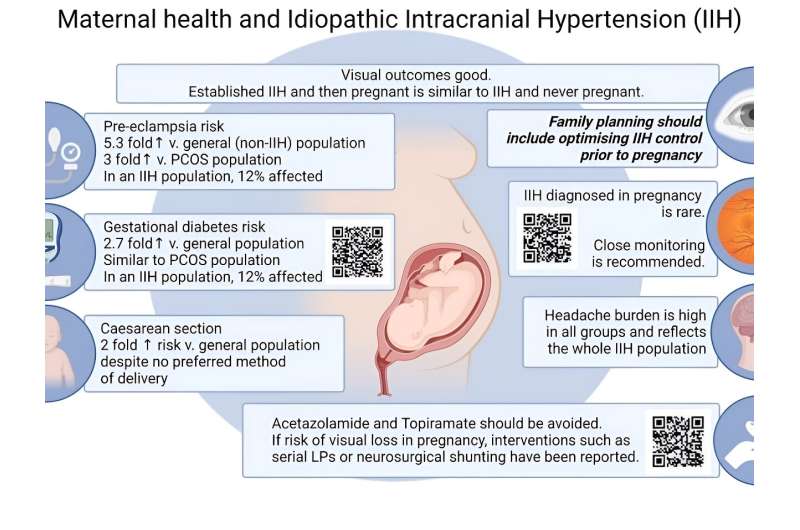This article has been reviewed according to Science X's editorial process and policies. Editors have highlighted the following attributes while ensuring the content's credibility:
fact-checked
peer-reviewed publication
trusted source
proofread
IIH patients require closer monitoring during pregnancy for pre-eclampsia, gestational diabetes, research shows

Published in the BJOG: An International Journal of Obstetrics and Gynaecology, a study unexpectedly found that pregnancies in idiopathic intracranial hypertension (IIH) patients were associated with a 12% risk of pre-eclampsia and gestational diabetes. This was five times and 2.7 times higher in IIH patients than in the general population respectively.
The pre-eclampsia risk for IIH patients was also higher than patients with polycystic ovarian syndrome (PCOS) but without IIH. The reasons for these increased risks may be due to multiple factors and further research is needed to better understand why this is.
IIH is a condition associated with raised fluid pressure (cerebrospinal fluid) around the brain. This raised pressure can press on the nerves carrying visual messages from the eye (optic nerve), causing swelling known as papilledema which if not treated can lead to visual loss. Headaches and other symptoms are often problematic in and debilitating in people with IIH. It predominantly affects women of reproductive age with obesity. However, despite this there has been limited research into the relationships between IIH and pregnancy.
To address this further, another related research study published in Neurology, which is the largest study of pregnancy and IIH to date, was carried out in Birmingham. It showed good visual outcomes in IIH patients who had a subsequent pregnancy, and highlights that, where possible, controlling IIH, ideally so optic nerve swelling has settled, prior to a planned pregnancy is recommended. Patients diagnosed with IIH for the first time in pregnancy was rare, but had worsening optic nerve swelling during pregnancy, and need closer monitoring throughout pregnancy.
Cesarean sections as a method of delivery were twice as likely in patients with IIH. This is despite international guidance highlighting that IIH alone is not a reason for surgical delivery. It is however unclear whether this was because of doctors' decisions, patient choice, other health problems or a combination of these.
Dr. Mark Thaller, first author of both publications and Clinical Lecturer in Neurology at the Institute of Metabolism and Systems Research in the University of Birmingham, said "Maternal health has been under researched for too long. The impact that health conditions and pregnancies have on each other need further research to enable better guidance and support to be provided. We hope that through investigating IIH and pregnancy, IIH patients will be able to get early and effective support throughout pregnancy and in childbirth."
Professor Alexandra Sinclair, Professor of Neurology at the Institute of Metabolism and Systems Research, said "This research is of clear importance. The data highlights that close working with obstetricians is key to optimize reproductive health in female patients with IIH."
More information: Mark Thaller et al, Idiopathic intracranial hypertension: Evaluation of births and fertility through the Hospital Episode Statistics dataset, BJOG: An International Journal of Obstetrics & Gynaecology (2022). DOI: 10.1111/1471-0528.17241
Mark Thaller et al, Disease Course and Long-term Outcomes in Pregnant Women With Idiopathic Intracranial Hypertension, Neurology (2023). DOI: 10.1212/WNL.0000000000206854. n.neurology.org/content/100/15/e1598




















